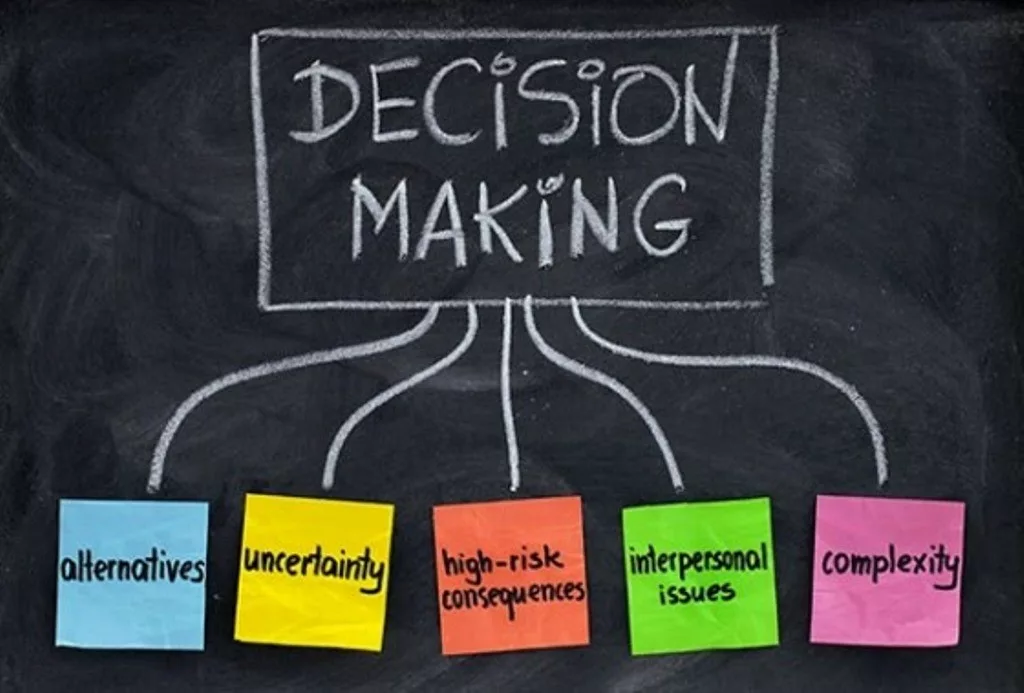“Whatever course you decide upon, there is always someone to tell you that you are wrong. There are always difficulties arising which tempt you to believe that your critics are right. To map out a course of action and follow it to an end requires courage.” – Ralph Waldo Emerson
Effective decision-making is a crucial leadership competency. Leaders are in charge of making decisions that can have a profound impact on the objectives, vision, and mission of their organisations.
The identification of issues, gathering information, consideration of alternatives, and selection of the best course of action are all components of effective decision-making.
I will go as far as to argue that as a leader, you are constantly faced with many kinds of decisions throughout each day, week, month and year. Your choice has the potential to influence not just today, but the entire course of your business or personal life trajectory.
Several years ago, as an emerging leader in a middle management role, I had the responsiblility of taking decisions and defending those decisions to senior managers. I quickly realised that my decisions were initially scrutinised throroughly by my superiors until I started figuring out the key questions they sought answers to. For instance, key questions regarding the longterm impact of certain procurement decisions, whole life costs of items, durability of materials, contractual terms and their impications for the organsiation, etc..
Aftermaking a mental note of these, I grouped them into three to five ‘buckets’ and I started filtering my decisions through those lenses. Over time, I began to notice a shift in my managers’ approval times. She no longer waited to ask those questions because I had anticipated them in advance and was providing the answers in my request for approvals. These became the guiding principles for decision-making all through my time in the role and as I later progressed to more significant leadership positions thereafter.
The following are some key lessons any leader or aspiring leader should take to cultivate effective decision-making. I believe these steps will help you to create a framework for better decisions.
Define The Problem
Clearly define the problem or issue that needs to be addressed. This involves getting all the facts right about the problem. Be attentive to the details so as to get the whole picture. Remember as a leader, the decision you make will either build or destroy the parties involved. Being attentive to the problem and analysing the problem will help you to focus on the key factors that need to be considered in making your decision. The identified key factors will help you make a well-informed decision that will be acceptable to all.
Gather Information
Collect all the relevant information and data about the problem. This will help you paint a clear picture of the magnitude of the problem. This may involve consulting with stakeholders, researching the issue, and seeking input from experts. The consultation gives an expert perspective and enables you to tackle the issue from a different angle. Sufficient information helps a leader make an elaborate decision.
Evaluate Options
Once you have gathered all the relevant information, it will help you come up with possible solutions. Evaluate the solution options available to you keenly. Consider the potential outcomes, risks, and benefits of each option. Remember the final decision bears different impacts on different people. Ensure the decision is more building than destroying.
Seek Input
After keenly evaluating your solution options, make a short list of the most applicable solutions. Invite your team, stakeholders, and other experts to get their input on the same and discuss in depth the possible outcomes, risks, and benefits of each option. This can help you to identify blind spots, potential challenges, and alternative solutions for effective decision-making.
Make A Decision
Based on your evaluation and input provided by your team and experts, make a decision. It is important for you to be confident in your decision. This will instill a sense of strong leadership among your team. Also, be open to revising your decision if some new viable information arises. Communicate the decision clearly to your team and stakeholders. This will help to build trust and ensure that everyone is on the same page.
Evaluate The Decisions
One important and final step in decision-making is an evaluation. Right after implementing your decision, evaluate how effective the decision is. This crucial move will greatly help you to identify areas for improvement. It also facilitates the making of adjustments if need be. It will help draw a road map for future decision-making by prioritising the wins and improving the losses.
A few reflection questions for you, my reader
- Did the previous decision I made lead to success or failure?
- Whom should I involve in the decision-making?
- What are the benefits and risks in decision-making?
- What is the most effective way to communicate your decision to your team?
- Is the decision you’re making in line with the organization’s core values?
Remember, you don’t always have to be the expert. Others on your team can serve as point people, allowing you and those you lead to benefit from their experience and wisdom.
There are many other things you can do to help you make effective decisions. However, if you focus on these six tools, you are off to a good start. It may not guarrantee the best decisions always, but you would have improved your odds at making good decisions significantly.
In conclusion, remember the Emerson quote above, Afterall, we live in a constantly changing world, and the best we can do is to lead the best way we can.
Dr. Akin Oke is an executive coach and convener, Leadership Express – a global leadership development platform. He is based in Abuja. Nigeria.





